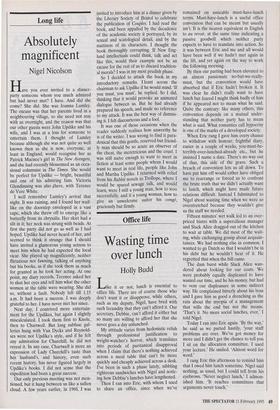Office life
Wasting time over lunch
Holly Budd
Like it or not, lunch is essential to office life. There are of course those who don't want it or disapprove, while others, such as my deputy, Nigel, have bred with such fecundity that they can't afford it. Our secretary, Debbie, can't afford it either but so many are willing to afford her that she never goes a day unlunched. My attitude varies from hedonistic relish through professional justification to weight-watcher's horror, which translates into periods of puritanical disapproval when I claim that there's nothing achieved across a meal table that can't be more quickly and cheaply achieved across a desk. I've been in such a phase lately, nibbling righteous sandwiches with Nigel and notic- ing how Debbie's lunches have lengthened.
Then I ran into Eric, with whom I used to share an office, since when we've remained on amicable must-have-lunch terms. Must-have-lunch is a useful office convention that can be meant but usually isn't. It is the nearest equivalent in English to au revoir, at the same time indicating a passive goodwill which neither party expects to have to translate into action. So it was between Eric and me and all would have been well if we hadn't met again in the lift, and yet again on the way to work the following morning.
By then our parting had been elevated to an almost passionate no-but-we-really- must, but the convention would have absorbed that if Eric hadn't broken it. It was clear he didn't really want to have lunch but feared I might think badly of him if he appeared not to mean what he said. Quite the contrary: like many others, this convention depends on a mutual under- standing that neither party has to mean what is said. What romantics call hypocrisy is one of the marks of a developed society.
When Eric rang I gave him every chance to withdraw with honour; frightful diary, easier in a couple of weeks, you-must-be- terribly-over-lunched-already etc., but he insisted I name a date. There's no way out of that, this side of the grave. Such a breach of convention lets us all down. To have put him off would either have obliged me to rearrange or forced us to confront the brute truth that we didn't actually want to lunch, which might have made future relations difficult. Instead I fulminated to Nigel about wasting time when we were so overstretched because they wouldn't give us the staff we needed.
Fifteen minutes' wet walk led to an over- priced bistro with a supercilious manager and Slack Alice dragged out of the kitchen to wait at table. We did most of the wait- ing, while exchanging gossip about acquain- tances. We had nothing else in common. I wanted to go Dutch so that I wouldn't be in his debt but he wouldn't hear of it. He regretted that when the bill came.
The dam burst while Slack Alice wan- dered about looking for our coats. We were probably equally displeased to have wasted our time, and he his money, but had to vent our displeasure in some indirect way. He complained bitterly about his boss and I gave him as good a drenching as the rain about the myopia of a management that wills the end but not the means. `That's it. No more social lunches, ever,' I told Nigel.
Today I ran into Eric again. 'By the way,' he said as we parted hastily, 'your staff problems are over. We've got money for more and I didn't get the chance to tell you I sit on the allocation committee. I used your lecture.' He smiled. 'Almost word for word.'
I rang Eric this afternoon to remind him that I owed him lunch sometime. Nigel said nothing, as usual, but I could tell from his eyebrows. 'Never neglect lunch,' I admon- ished him. 'It reaches committees that arguments never touch.'


























































 Previous page
Previous page